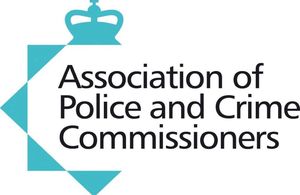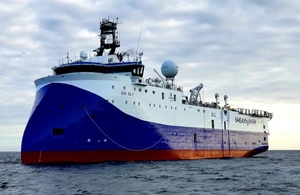Public Sector Research Establishments (PSREs) play an important role in the UK’s science, research, development and innovation landscape. Principally, they support government by providing science advice to policymakers, by acting as a strategic capability in policy delivery and by delivering critical science services for government business and society. The Science Capability Review 2019 recognised that PSREs represent a significant public asset that is currently under-utilised and not well understood across government.
The Government Chief Scientific Adviser (GCSA) Sir Patrick Vallance visited 2 key PSREs in July – Fera Science (Fera) and the Centre of Environment, Fisheries and Aquaculture Science (Cefas).
Centre of Environment, Fisheries and Aquaculture Science
The GCSA recently visited Cefas in Weymouth, along with the Chief Scientific Adviser at the Food Standards Agency, Robin May. Cefas provides world-class science for the marine and freshwater environment. During their visit, the GCSA and CSA gave a talk, and engaged in a Q&A with Cefas scientists on the importance of PSREs, science capability in government, and ensuring policy is evidenced by science.
The visit was predominantly focused on the work of the Animal and Human Health Science Theme at Cefas, and how Cefas is aligning its deep specialisms in hazard identification and control around a broader concept of One Health Surveillance. For example, Cefas is taking the lead on a new Defra international programme aimed at bringing together methods for assessing specific risks throughout the aquatic food supply chain and targeting controls at points within that chain where they can have most impact. This approach enhances both safe and sustainable food supply, and can also positively impact biodiversity and climate-efficiency of whole food systems.
During the laboratory tour the GCSA and CSA heard about Cefas’ national and international programme work, spanning aquatic animal pathology, accredited diagnostics, all gene profiling, bioinformatics, natural biotoxins, chemicals, food-borne pathogens, and antimicrobial resistance (AMR). Cefas’ work at its laboratory in Weymouth includes looking at the risks of AMR and assessing the potential impacts of chemicals in the aquatic environment, responsibility for delivering the official controls that help ensure that shellfish across the UK is safe to eat for consumers and control of outbreaks of fish and shellfish diseases in England and Wales. This helps to maintain high standards of biosecurity and animal welfare. All these capabilities help to inform policy and the operational responses both nationally and internationally.
Recent internal investments in cutting edge-technologies for chemical, microbial, and genomic profiling were also discussed during the visit, in relation to emerging opportunities for their application – including in the development of wastewater-based surveillance. This surveillance allowed the Defra group to help support the government’s COVID-19 response by testing wastewater samples. This supported effective decision making for NHS Test and Trace to identify how the virus was moving across communities, including new and emerging variants, before being picked up in clinical test data.
The GCSA and CSA also had a series of talks with bacteriologists, toxicologists, shellfish-hygiene experts amongst others to understand how pathogens and toxins are identified and reduce risk for humans, shellfish and molluscs. They were also told about the work of Cefas in other countries to support capacity to identify bacteria and do toxicology on shellfish and molluscs. These activities help support a more sustainable and reliable food source and Ghana and Bangladesh are just 2 of the countries where this work is taking place.
The GCSA said:
It was really great to discuss the importance of science capability in government, and ensure policy is evidenced by science, with the students and early career scientists I met at Cefas.
Fera Science
Fera are experts in safety, biosecurity and sustainability across the agri-food-environment chain. The GCSA visited the York site recently and was informed about Fera’s ongoing R&D activities in support of its Science Strategy and its future growth plans.
Fera is a unique member of the UK PSRE network, in that it operates as a public-private sector partnership under a joint venture business model established by Defra in 2015. This hybrid status has enabled Fera to continue to serve public-sector needs at a much lower cost by being more freely able (and incentivised) to deliver expert scientific services to industry customers and partners on a fully commercial basis. This has enabled Fera to fully finance several of the new infrastructure assets and expert services expansion which were presented on the GCSA’s tour of the Fera site.
Just one such example is Fera’s work on land use and natural capital assessments which the GCSA was introduced to on the tour. Fera’s work in this area supports new environmental land management schemes which aim to deliver national net zero carbon goals, and improve biodiversity and its measurement.
The Fera team also gave a presentation on Fera’s work to assess, improve and certify the proficiency of government and commercial-sector labs internationally. This work, for example, enables the UK to have confidence that the data produced by trading partner countries in support of their food and commodity exports are to a UK-equivalent standard.
This was followed by a brief talk on Fera’s food safety work at the main Thomson Laboratory location on site which houses over £30m of leading-edge analytical instrumentation which operates 24/7 to provide the analytical results supporting a wide range of Fera’s work; examples include statutory testing of maximum pesticide-residue levels in foods, assessing the safety for food contact of packaging materials, through to determining the origin and authenticity of food products which are at high risk of fraud and substitution.
The GCSA also saw the research and testing being conducted for public-sector bodies and commercial agro-chemical and veterinary-medicine companies to evaluate the safety of such chemicals in the natural environment, and their environmental fate. This featured a tour of Fera’s new state-of-the-art aquatic toxicology laboratories and the unique e-Flows Mesocosm which was built with the support of the Crop Health and Protection (CHAP) agri-tech centre and Innovate UK. This is a ‘world first’ large-scale outdoor field-test laboratory with 66 precisely metricated flowing-water channels which can accurately simulate the impact of chemical and biological interventions in the environment (such as pesticide application) upon the health of aquatic and invertebrate species.
Other experts in the Fera team moved on to talk the GCSA through their work on R&D for assays, molecular detection and genomic sequencing to assess whether plants have been genetically altered, and the measurement and regulatory challenges ahead in detecting the quality and safety of gene-editing processes.
In another example of some of Fera’s ‘breakthrough’ or pioneering work, the GCSA viewed its insect research facilities. Fera’s insect research has recently been expanded under a £1m investment made by Fera for a new pilot-scale production facility to support research programmes to evaluate and optimise the application of insect bioconversion at scale. Insect bioconversion is the process of feeding insects organic biomass waste to create additional materials, such as protein (for livestock feed) or bio-fertiliser. The technology can reduce waste, provide alternative (sustainable) sources of protein for animal feed and reduces the environmental impact of sourcing protein from already depleted areas (such as fishmeal and soy).
Reflecting on the visit, the GCSA said:
PSREs such as Fera are really important to help the UK increase its science and technology capability. It was fantastic to visit Fera and learn more about their leading work in agri-food-environmental science.

